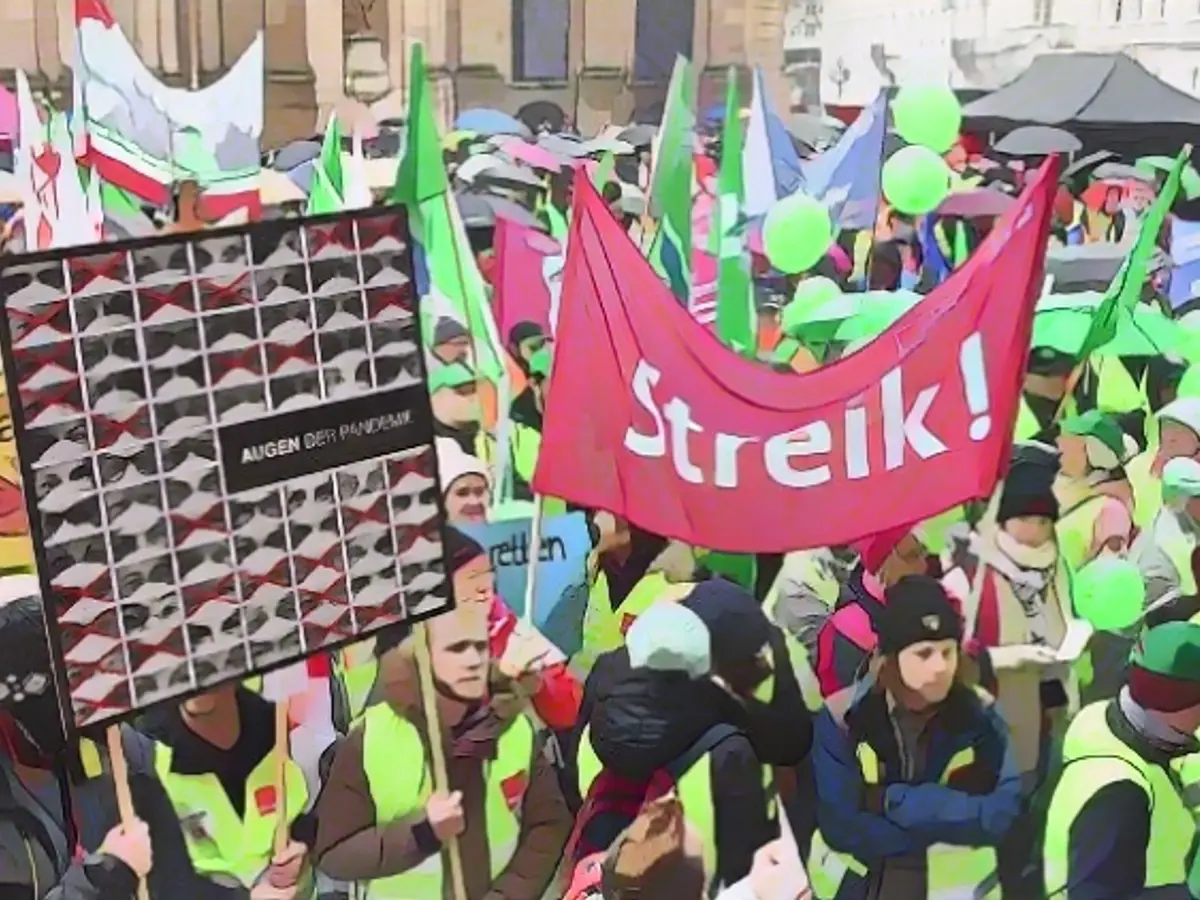Agreement or strike: finale in the wage poker game is imminent
Showdown in the public sector wage negotiations in the federal states: the unions have been on strike at universities, university hospitals and administrative offices for weeks. This Thursday, employers and employees will meet in Potsdam for the possible finale of their negotiations. There are signs of a breakthrough - but this is far from certain. The most important questions and answers at a glance:
Who is affected by the negotiations?
Around one million state employees are directly affected. Usually, an agreement is transferred to civil servants, which means that more than three million people are affected. Negotiations are taking place for teachers at schools and universities, for example, as well as for nurses and doctors at university hospitals. The penal system and justice system are just as affected as daycare centers in Berlin. Hesse is not affected, as the state is not part of the Collective Bargaining Association of German States (TdL), with which Verdi and the civil servants' association dbb sit at the table.
What are the unions demanding?
10.5 percent more income, but at least 500 euros more. Junior staff are to receive 200 euros more. The collective bargaining period should be twelve months. For Berlin, Hamburg and Bremen, the unions are demanding a city-state bonus of 300 euros. "We are campaigning for the loss of real wages to be compensated," reiterated Verdi boss Frank Werneke once again on Tuesday at a large demonstration in front of around 15,000 employees in Düsseldorf with a view to the months of high inflation in Germany.
What role does the current budget crisis play in the collective bargaining round?
The employers say they are limiting their options. The chairman of the Tarifgemeinschaft deutscher Länder (TdL), Hamburg's SPD Finance Senator Andreas Dressel, puts the cost of accepting the union's demands in full at 20.7 billion euros. According to Dressel, the impact of the Karlsruhe budget ruling could result in a reduction in available funds for the federal states in the double-digit billion euro range. "Of course, this is something that the federal states cannot easily compensate for," said Dressel. This would reduce the scope for distribution.
What are the negotiations based on?
The agreement reached in April for the federal and local public sector. After months of wrangling and arbitration, the result included tax and duty-free special payments totaling 3,000 euros, a basic amount of 200 euros and a subsequent 5.5 percent increase. The unions had also entered this round of collective bargaining with the demand for a 10.5 percent increase, but at least 500 euros more.
What is the significance of the federal and local government agreement?
It is particularly important for the trade unions. "We have to close the gap with the federal and state governments," said dbb boss Ulrich Silberbach. Verdi chairman Werneke said: "Tens of thousands of jobs in the public sector in the federal states are already vacant." He added that the real challenge of generational change was still to come. "Without appropriate pay that is comparable to that of the federal government and local authorities, the staffing situation will continue to deteriorate drastically."
Do the federal states want to adopt the federal and local authority agreements?
They want to remain financially below them. But TdL boss Dressel says that "in terms of structure", the federal states could imagine adopting the pay settlement from April. It would then be possible to start "relatively soon with a one-off payment". However, according to the TdL, a complete transfer of the federal and local government agreement would cost around 17 billion euros - too much for the employers.
So where are the sticking points?
Above all, the scope and possible stages of a linear increase, but also the significance and structure of one-off payments. The federal states do not agree at all with the demand for a city-state bonus for Berlin, Hamburg and Bremen. According to Dressel, this would create "new problems" - after all, there are also other metropolitan areas with high rents and living costs.
What are the scenarios for the current round of collective bargaining?
Silberbach and Werneke are first and foremost calling for an offer from the employers. Silberbach believes that an agreement in Potsdam is entirely possible - several state finance ministers have expressed their willingness to do so. Dressel also says: "That is our firm intention." In view of the crisis-ridden times, an agreement would be an important sign. But according to insiders, poorer countries are resisting what they see as too high a deal. The round of negotiations, which was originally scheduled to last two days, could drag on into the weekend.
What would be the consequences of failure in Potsdam?
There is no arbitration agreement for the federal states as there is for the federal government and local authorities. Werneke had pointed out the possibility of further negotiation dates if the third round failed. This could then be accompanied by further warning strikes. Silberbach refers to the walkouts and actions of recent weeks and "the anger and determination" of the employees. He even says: "Colleagues are also capable of enforcing strikes in many key areas in the federal states." The unions would have to initiate such a broad strike by ballot.
Read also:
- Why there is still no EU funding for green Saar steel
- 3 billion Saar Fund is unconstitutional
- Politicians at a loss after shock news
- Court of Auditors criticizes the state government's debt plan
In the negotiation process, the German Civil Service Association (dbb) along with Verdi, represents the interests of civil servants.Frank Werneke, the head of Verdi, has been vocal about the need for higher wages to compensate for inflation-induced losses.The employers, including those represented by the Tarifgemeinschaft deutscher Länder (TdL), are constrained by budgetary considerations, particularly in light of the Karlsruhe budget ruling.
Source: www.ntv.de








